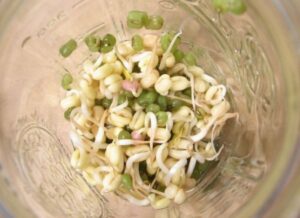Is It Safe to Munch On A Mouthful of Sprouts

Bean sprouts have long had a reputation as being easy to contaminate, but are they any less safe than other pre-washed vegetables that we regularly consume?
Jason’s Deli says yes. This Texas-based sandwich chain has pulled sprouts from the menus of its 231 restaurants due to ongoing recalls and concerns over customer safety. Restaurant Sweet Tomatoes removed sprouts from their menus almost a decade ago, citing the “well-documented food-safety risk of serving sprouts.”
Why are sprouts so easy to contaminate? Unlike most fresh produce, seed sprouts need warm, humid conditions to grow. This is also the preferred environment for many bacteria, which are present in the seed itself and therefore cannot be completely eliminated. Currently, commercial sprouts are doused in chemicals (the seeds are soaked in a chlorine solution) to try and combat contamination, but even these harsh measures are not completely effective.
No matter what type of sprouts you are choosing – mung bean, soybean, alfalfa, fenugreek, clover or radish – this fresh produce is more likely to be contaminated than most.
This past summer sprouts were big news in Germany for causing one of the world’s worst outbreaks ever of e. coli, which sickened 3,000 people and killed more than 50. The contamination was traced to an organic fenugreek sprout farm outside of Hamburg. The infected persons had all chosen to eat locally and organic.
In the United States last summer there were multiple recalls over sprouts contaminated with Salmonella as well as listeria, both potentially fatal pathogens. Sprouts now have their very own page at FoodSafety.gov, which states that since 1996 there have been at least 30 reported outbreaks of food borne illness associated with sprouts. 24 of those recalls have occurred since 2007.
What about homegrown bean sprouts? Sorry, but since the bacteria is contained in the seed itself, it could grow to harmfully high levels during sprouting, even in 100% sanitary conditions. Like eating raw egg, eating raw bean sprouts contains an element of risk, and each consumer must decide for himself or herself whether it’s worth it.
The FDA advises all “children, the elderly, pregnant women and persons with weakened immune systems” to avoid sprouts entirely, and that all other consumers should cook sprouts thoroughly.
Fresh produce will always carry more of a risk than processed foods, for the very reason that it is fresh. And the FDA seems to warn against everything – everything that brings pleasure, anyway. Are bean sprouts super risky or just another victim of the commercial farming system?
Make the choice for yourself, but after researching bean sprouts all morning, this longtime sprout-lover will replace her favorite bagel staple with fresh spinach or field greens from now on.
image: L. Marie
sources:
http://www.nytimes.com/2011/06/11/world/europe/11ecoli.html?_r=2
http://www.foodsafety.gov/keep/types/fruits/sprouts.html
http://www.thepacker.com/fruit-vegetable-news/Jasons-Deli-Sprouts-are-out-137959928.html

